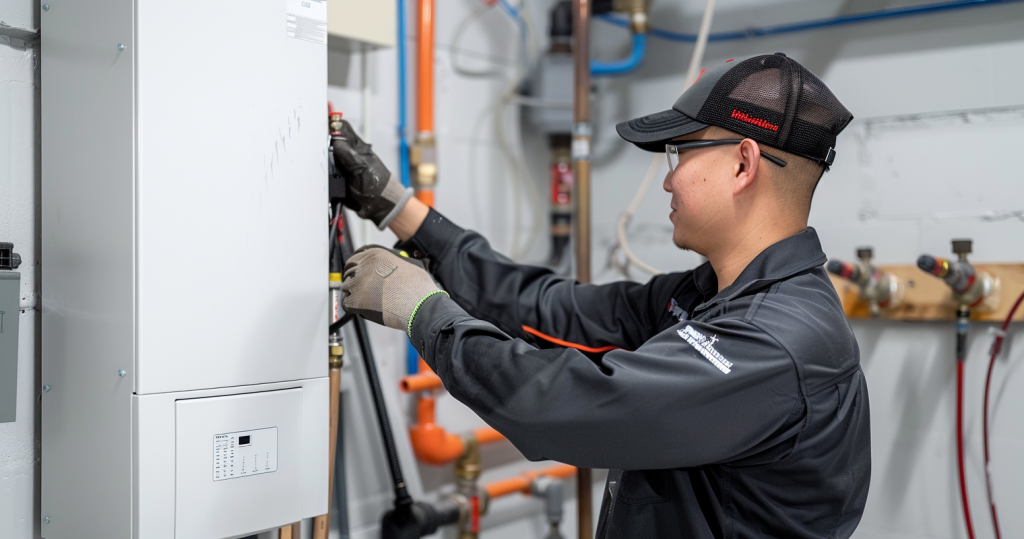What Is A Tankless Water Heater? Save Energy Now!
Key Takeaways
- Tankless water heaters heat water only when you need it, using electricity or gas. This saves energy and means you’re not always paying to keep a big water tank hot. The guide will help explain what is a tankless water heater.
- You can choose from different tankless water heaters, such as electric, gas, non-condensing, condensing, and hybrid models. Each type has unique benefits depending on your home’s size and your family’s needs for hot water.
- These heaters are more efficient than traditional ones with tanks because they use 24% to 34% less energy. They also offer an endless hot water supply and save space in your home since there’s no large tank.
- Installing a tankless water heater might cost more than a regular one. But they save money in the long run by cutting your monthly bills due to their high efficiency.
- Newer models even have Wi-Fi compatibility, letting you control temperature settings and monitor usage through a smartphone app for added convenience.
- See our guide to the 10 Best Tankless Water Heaters 2024!
What is a Tankless Water Heater?
A tankless water heater, sometimes called an on-demand water heater, heats water only when needed. This means no big tank sitting around holding hot water all day.
Definition and basic function
Choosing the best tankless water heater for your home in 2025 requires careful consideration to maximize your investment’s value. Also known as on-demand or instantaneous water heaters, these modern appliances represent the latest water heating technology.
Unlike traditional storage systems, tankless units heat water only when needed, eliminating the energy waste of continuously keeping a large water tank hot. This innovative approach can reduce energy costs by up to 34% for many households.
Available in electric and gas-powered models, these systems use advanced technology to warm incoming water instantly as it flows through the unit. Many now feature smart technology integration for remote monitoring and control.
The key advantage is the unlimited stream of hot water without traditional wait times. Whether running multiple showers, washing dishes, or doing laundry, these efficient units deliver consistent hot water at your desired temperature, making them an increasingly popular choice for modern homes.
Types of Tankless Water Heaters
Tankless water heaters are revolutionizing how we heat water in our homes. They come in various types to suit different needs and preferences. Here’s a rundown of the main kinds you’ll find on the market:
- Non-Condensing Tankless Water Heaters: These are the pioneers in the tankless world. They use a heat exchanger to heat water instantly as it flows through the device. Since they don’t store water, they’re more energy-efficient than traditional tank types. However, they do require good ventilation due to exhaust gases.
- Condensing Tankless Water Heaters: A step up in technology, these models capture exhaust gases and use them to help heat incoming water. This process makes them even more efficient than their non-condensing counterparts. They’re a great choice if you’re looking for high efficiency, but remember that they might need larger vent pipes.
- Hybrid Tankless Water Heaters: Combining features of both tankless and tank-type heaters, hybrids offer an excellent balance of performance and energy savings. They can store a small amount of heated water to reduce wait times for hot water, making them super convenient for households with high demand.
- Electric Tankless Water Heaters: Electric models use electrical elements to heat the water directly on demand, making them highly efficient and environmentally friendly since there’s no combustion involved. These are ideal for smaller spaces or regions where gas is not readily available.
- Gas Tankless Water Heaters: Using natural gas or propane, these heaters can offer higher flow rates than electric models, which means they can handle higher demands for hot water — perfect for large families or homes with multiple bathrooms.
- Point-of-Use Tankless Water Heaters: Designed to be installed near where hot water is used most frequently, these compact units can provide instant hot water right where needed — eliminating long waits and reducing waste.
- Whole-House Tankless Water Heaters: Contrary to point-of-use models, whole-house systems are designed to efficiently and effectively meet all the hot-water needs of your home—whether that’s taking a shower, doing laundry, or washing dishes simultaneously.
Each type offers unique benefits, from space savings to endless hot water supplies, while being more energy-efficient than traditional tank-type heaters.
How Do Tankless Water Heaters Work?

Tankless water heaters heat water directly without the need for a storage tank. When you turn on the hot water tap, cold water travels through a pipe and into the unit, which is heated by either an electric element or a gas burner, delivering hot water at your command.
Flow rate and energy efficiency
Defining a tankless water heater’s flow rate at any time is important. Electric models From the two have a slightly lower flow rate than gas-powered ones. They do issue the sought hot water faster, hence, no chances of running out of hot water in most household applications.
On the flip side, energy efficiency in these heaters shines because they only heat water when needed—no wasting energy on keeping a large tank hot all day and night. According to Energy.gov, homes that use 41 gallons or less of hot water daily see up to 34% greater efficiency with tankless options.
Such a configuration allows the homeowner to save on utility bills while sustaining the environment. All those advantages make it critical to view installation specifics for the following reasons when considering a switch to an on-demand system.
Considerations for installation
Choosing the right tankless water heater involves more than just picking a model. It’s important to consider fuel type, local climate, and building codes. These factors influence both installation and performance.
Thus, you will have to find a unit for the hot water demand of your home of corresponding capacity, and that might just be checking if the present gas lines will support such a new heater and remembering what it needs for ventilation.
All of these mean that an effective unit has to be maintained effectively. Thinking ahead to transitioning to an on-demand, tankless system? A. O. Smith doesn’t leave anything to chance in its gas and electric installation guides, complete with detailed model steps.
Regular maintenance is required to keep top performance over time. Be ready for such ongoing commitment after installation.
Pros of a Tankless Water Heater
The allure of tankless water heaters lies in their compact designs and the relentless stream of hot water they promise—imagine never facing the rude shock of a cold shower again.
They transform energy into savings, showcasing an efficiency that traditional tanks can hardly match, a triumph for both your home and your wallet.
Space savings
Space efficiency is one of the most compelling advantages of tankless water heaters in 2025. These innovative units mount directly on the wall, dramatically reducing the footprint compared to traditional tank systems monopolizing valuable floor space.
The compact design makes tankless heaters particularly attractive for modern living spaces where every square foot counts. Their versatile installation options allow them to be placed at specific points of use throughout the home, optimizing space and performance. This flexibility proves especially valuable in apartments, condominiums, and smaller homes where space optimization is crucial.
In urban environments, where living space comes at a premium, the space-saving design of tankless water heaters offers a practical solution without compromising performance. Their slim profile and strategic mounting options transform what was once a space-consuming necessity into an efficient, almost invisible component of your home’s infrastructure, all while delivering unlimited hot water on demand.
Endless supply of hot water
A tankless water heater delivers the ultimate convenience: an endless supply of hot water that transforms daily routines into seamless experiences. Gone are the days of scheduling showers around hot water availability or waiting for the tank to recover between loads of laundry.
Modern tankless systems deliver impressive flow rates ranging from 2 to 8 gallons per minute, ensuring consistent hot water delivery for multiple simultaneous uses. This means you can run the dishwasher and shower and start a load of laundry without experiencing temperature fluctuations or that dreaded cold-water surprise.
This continuous hot water availability revolutionizes home management, offering a new level of convenience and efficiency. Whether filling a deep soaking tub, running back-to-back showers for a large family, or tackling multiple household tasks simultaneously, a tankless system ensures your hot water needs are met without interruption, making it a true lifestyle upgrade for the modern home.
Energy efficiency
The outstanding energy efficiency of tankless water heaters—30 to 50% less energy than units with tanks—can mean substantial monetary savings on monthly bills and less environmental damage.
The heater heats water when you need it. Therefore, it avoids the excess energy and CO2 emissions waste, and your home is more ecological.
Demand models can be up to 34% more efficient in homes using less hot water daily, according to the Department of Energy. Changing to an on-demand model could spell significant, cost-effective benefits for you and the planet.
Next, consider how easy they are to install and what you should consider before switching.
Cons of a Tankless Water Heater
While tankless water heaters have many benefits, they’re not perfect. You might face some bumps in the road—think about needing more power upfront and losing hot water if the electricity goes out.
Output challenges

One of the problems with a tankless water heater is size-based, assuming, of course, that its size is not appropriate for the hot water demand of a homeowner. If an appliance is smaller than necessary, then the temperature from a tap can be inconsistent, and hot water is probably less than you might want.
Hard water can also cause problems, damaging the system and affecting performance.
Repairing or replacing the tankless unit tends to be more expensive than tank models. Problems such as insufficient flow rate can take you by surprise: the shower hour. These are significant factors that make it important to consider before switching to have your home both warm and cost-efficient.
Higher upfront cost
The initial investment in a tankless water heater in 2025 represents a significant upfront cost, with current prices ranging from $1,500 to $4,000 for quality units. This price point sits notably higher than conventional tank systems, and when factoring in professional installation, expect to invest 30-60% more than a traditional water heater setup.
While this substantial initial expense might cause some homeowners to hesitate, it’s essential to consider the long-term financial perspective. The higher upfront cost includes advanced technology, superior materials, and more sophisticated engineering, contributing to the unit’s longevity and efficiency.
One limitation to consider is the dependency on power for operation – both electric and gas models require electricity to run their electronic controls. However, this can be mitigated with a backup power solution. Modern units also offer smart features and enhanced efficiency that weren’t available in earlier models, helping to offset the initial investment through reduced operating costs and increased home value.
No hot water during power outages
Modern tankless water heaters, both electric and gas-powered, rely on electricity to operate their electronic controls and safety systems. This dependency on electrical power presents a notable consideration for homeowners.
During power outages, tankless water heaters stop working, regardless of their primary energy source. Unlike traditional tank-based systems that can retain heat after power loss, tankless units provide no hot water when electricity is unavailable. This is due to their on-demand heating design, which doesn’t store pre-heated water.
Some homeowners opt for backup power solutions such as generators or battery systems to address this vulnerability. Others maintain a small traditional tank water heater as a backup for critical needs during outages. As extreme weather events become more common, tankless systems are increasingly relevant in 2025 for those in areas prone to power disruptions.
Conventional units keep some hot water ready, even when you lose power. But with on-demand heaters, the moment electricity cuts out, your supply of warm showers does, too. Next, let’s look at how recent innovations make tankless water heaters even better.
Latest Innovations in Tankless Water Heaters
Tankless water heaters are getting more intelligent and efficient—check out the latest features that could impact your decision.
Higher efficiency
Modern tankless water heaters are way better at saving energy than old-school water heaters. Think of it like this: older tank heaters waste about 35-40% of their energy, while new tankless systems waste much less.
Want to know how much money you can save? These new systems can cut your water heating bills by 24% to 34%. If your family usually spends $100 on heating water monthly, you might only spend $66 to $76 with a tankless system. Pretty cool, right?
Companies that make these water heaters are always developing new ways to improve them. They’re adding smart features like WiFi controls and better heating technology. It’s like upgrading from an old flip phone to a new one- everything works better and smarter.
These improvements aren’t just good for your wallet but also the environment. Using less energy means your home produces less pollution, which helps keep our planet healthier.
Instant hot water
Hey, let me tell you why tankless water heaters are pretty awesome! Imagine never having to wait for hot water again – you turn on the tap, and BAM! Hot water right away. No more yelling, “Who used all the hot water?” across the house!
It’s like having a mini power plant just for your water. Instead of keeping a huge tank of water hot all day (which is super wasteful), these new heaters only work when needed. Think of it like a toaster – it only heats up when you want toast. Same idea!
The cool part? You can take as long a shower as you want, run the dishwasher, and do laundry simultaneously without running out of hot water. The newest models are super fast, too – they can heat water so quickly that you won’t even notice a difference from your old tank.
Plus, since it only heats water when needed, you’re not wasting energy keeping a giant tank of water hot all day. That means lower energy bills – which your parents will love!
Wi-Fi compatibility

Modern tankless water heaters are becoming more modern with Wi-Fi compatibility. This feature allows homeowners to control their heating systems with a few taps on a smartphone.
Users can adjust the temperature, monitor usage, and even receive maintenance alerts. It’s all about making life easier and more efficient.
Wi-Fi-enabled tankless water heaters integrate smoothly into smart home technology. With remote access through mobile apps, managing hot water becomes part of your digital routine.
Consider changing the water temperature to be used in your bath from your bed or checking if the heater is on from your house before going out. This is exactly what the latest home appliance technology integration offers: unparalleled convenience and total control right in the palm of your hand.
Final Thoughts
Let me tell you about tankless water heaters – they’re like the smartphones of water heating! Instead of storing hot water in a big tank like the old-school heaters, these smart devices heat water right when needed.
What makes them super cool is that they can cut your family’s energy bills by 24-34%! That’s like getting free hot showers for a few months each year. Plus, they’re tiny compared to those huge tank heaters – about the size of a backpack – so they don’t take up much space in your house.
Sure, they cost more to buy at first (like getting the latest iPhone), but they make up for it by saving money on your bills. The newest ones even have WiFi so you can control them from your phone! How crazy is that?
As technology developed, all that was replaced by new models, which were even more effective. Some even had Wi-Fi connectivity. All these have further improved the tankless water heater user experience and potential energy savings.
Before getting one, you’ll want to think about:
- Where you want to install it
- How much hot water your family uses
- What type works best for your house (gas or electric)
These water heaters are the future of home hot water. They never run out of hot water (goodbye cold showers!), save money on bills, and help the environment by using less energy. It’s like having an endless supply of hot water that’s also good for the planet!
FAQs
1. What does a tankless water heater do?
A tankless water heater instantly heats water on demand, meaning you get hot water when you need it without waiting.
2. Is a tankless water heater better than one with a tank?
Yes, because it’s more energy-efficient and provides endless hot water, making it a smart choice for many homes.
3. How long does a tankless water heater last?
Proper maintenance means a tankless water heater can last up to 20 years – longer than traditional models!
4. Can I install a tankless water heater in my apartment?
Absolutely! Their compact size makes them perfect for apartments or small spaces.
5. Will I save money by switching to a tankless water heater?
Yes, you’ll likely see lower utility bills since they’re more efficient and use less energy.


